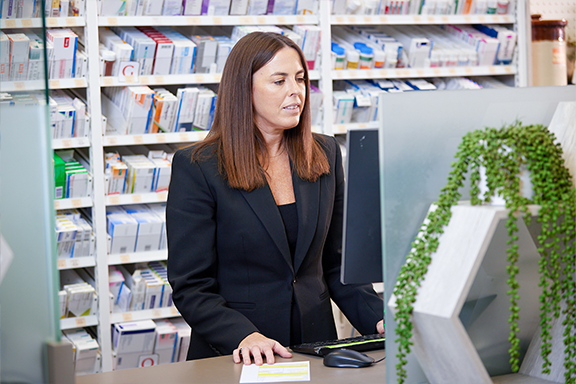*Disclaimer: This article was published in 2020 and reflects the information available at that time.
Scenario: Community Pharmacy – present day
“Prescription for Mrs Thompson”
An elderly woman appears from behind a stand of hand sanitiser.
“Are you Mrs Thompson?”
“Yes”
“Have you had this before?”
“Yes”
Mrs Thompson disappears out the door (quite rapidly given she is 86 years and 4 months old). Unfortunately, she is not Mrs Thompson, her name is Mrs Thomas. Mrs Thompson takes Xarelto20mg and Minax 100mg. Mrs Thomas was meant to be receiving two Asmol 100mcg inhalers (but there were none) and irbesartan 75mg (your last one).
10 minutes later, an irate woman, Mrs Thompson appears, stating that she has been waiting “forever” and “does not want to hang around any longer and catch the virus and miss Dr Phil”. You turn the pharmacy upside down looking for her script which is nowhere to be found. However, you do find Mrs Thomas’s medication.
You go pale and feel like you need an ondansetron. You quickly relabel Mrs Thompson’s medication and explain that her repeats are missing and you will get them to her later. She leaves mumbling about how terrible the service is and that she might call her son who is a lawyer.
You need to contact Mrs Thomas immediately. You dash out into the street bearing in mind that if Mr Dobbin, the pharmacy board inspector, turns up you will have to explain yourself. Mrs Thomas is nowhere to be found and your blood pressure is steadily increasing. You have no number listed in the dispensary system and she is not listed in the white pages. You contact her doctor’s surgery and they are closed for lunch. You are hungry and your coffee is now cold.
You carry on and call the medical centre as soon as they reopen after lunch. The receptionist cooly explains that it will be breaching privacy if she provides you with Mrs Thomas’s number. You explain the urgency of the situation and the receptionist huffily says that she will check with the doctor but he is “very busy with Telehealth consults”. She finally gets back to you with the number.
You dial and speak to a very deaf gentleman by the name of Bill Thomas. He initially thinks you are from an overseas call centre and hangs up on you. You call back and explain that Mrs Thomas might have the incorrect medication. He doesn’t really understand and says that Vi (Mrs Thomas) is still out and he has no idea when she will be back and she does not possess a mobile phone. You ask Bill to pass on the message that as soon as Mrs Thomas comes home she is to contact the pharmacy immediately.
By 5pm you have eaten half a pack of Glucogels for lunch, have done 50% more prescriptions than usual, and one of your junior shop assistants is in tears. You remember Mrs Thomas and call the number again, no one answers. You are at breaking point and eat the rest of the Glucogels.
Half an hour later you receive a call from Bill. Vi did not make it home, she took the tablets that you gave her and had a severe asthma attack and is in the local hospital. He mentions that Vi’s daughter is very distressed and is unable to visit her due to the COVID-19 restrictions, and the daughter will be contacting you in the morning.
Although this scenario is “worst case”, PDL has actually seen many situations like this unfold. It can be avoided by consistent procedures.
All medications given out by pharmacy staff should be verified using several key indicators. Simply asking a patient it if is for them or handing it to a patient that has responded to a name is insufficient. Patients in a hurry may respond to any name and often patients will have similar last names resulting in misadventure.
Measures used to identify patients are more useful when asked as open-ended questions:
- What is your first and last name? – you may wish to clarify the spelling
- What is your address? – you may wish to be less specific by asking house number or street name to protect privacy
It is suggested that pharmacy staff should routinely use several points of identification to ensure the correct medication or DAA is being handed out.
PDL members can call 1300 854 838 for advice and incident support from one of our Professional Officers. Supporting our pharmacist members 24/7.



